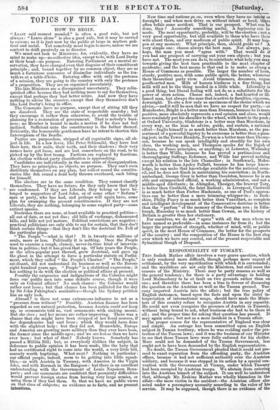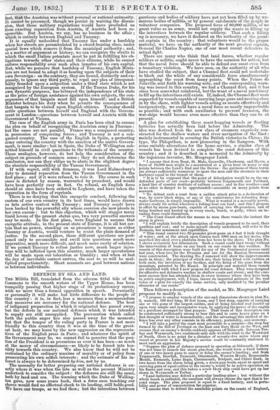RESPONSIBILITY OF TUSCANY.
Tun foolish Mather affair involves a very grave question, which is only rendered more difficult, though perhaps more urgent of settlement, by the very mystification with which it is surrounded; and the mystifiers are not only the Ministers, but still more the censors of the Ministry. There may be party reasons as well as the general tendency ; for there is a party advantage in holding Lord Malmesbury to be at fault on two grounds rather than on one; and therefore there has been a bias in favour of discussing the question on the Austrian as well as the Tuscan ground. Tus- cany imported Austria into the affair ; but the true policy of English statesmen, based upon the facts and upon the strict in- terpretation of international usage, should have made the Minis- ters of this country refuse to recognize Austria in any capacity. He could not even recognize the presence of Austria in Tuscany, without being bound to ask, what business she had to be there at all ; and the proper time for asking that question has passed. It may again arise ; but not as a mere incident in a Tuscan affair. The proper course for the representative of England was clear and simple. An outrage has been committed upon an English
subjei ct in Tuscan territory, where he was residing under the .pro- tection of the Tuscan laws ; and it was the business of our Minister to see that those Tuscan laws were fully enforced for his shelter. More could not be demanded of the Tuscan Government, less ought not to have been demanded by the English representative. No doubt, the Tuscan Government pleaded that it could not pro- ceed to exact reparation from the offending party, the Austrian officer, because it had not sufficient authority over the Austrian soldiery, and because it was stopped in its action by a special con- vention with the Government at Vienna, under which Tuscany bad been occupied by Austrian troops. We abstain from entering into the Austrian branch of the subject. It can well be understood that, although Mr. Erskine Mather was wholly blameless in the affair—the mere victim in the accident—the Austrian officer also acted under a peremptory necessity according to the rules of his service. It may be supposed, though there is no evidence of the fact, that the Austrian was without personal or national animosity. It cannot be presumed, though we persist in waiving the discus- sion, that those military regulations would have precluded us from exacting reparation from Austria, if Austria had been re- sponsible. But Austria, we say, has no business in the affair ; which is entirely between England and Tuscany.
It is equally undoubted that Tuscany lies under a hardship when her streets are perambulated by a sword-bearing class, under special laws which remove it from the municipal authority ; and, as a matter of argument or history, we can recognize the straits to which the small Italian potentate must be put in fulfilling his ob- ligations towards other states and their citizens, while he cannot enforce responsibility over such alien inmates of his own capital. But, while we perceive that hardship of Tuscany, English Minis- ters are not bound to adopt it as bearing upon the subjects of their own Sovereign : on the contrary, they are bound, distinctly and ex- pressly, to ignore any third party, to repel any plea of irresponsi- bility founded upon a subjection under a third state which is not recognized by the European system. If the Tuscan Duke, for his own dynastic purposes, has betrayed the independence of his state as the price of foreign assistance against his own subjects, the con- sequences of that bargain must fall upon himself; and a British Minister betrays his duty when he permits the consequences of that bargain to be visited upon English citizens. Tuscany should settle questions between herself and England with the Govern- ment in London—questions between herself and Austria with the Government at Vienna.
The case of the English army in Paris has been cited to excuse the plea on behalf of recognizing the Austrian army in Florence : but the cases are not parallel. France was a conquered country, in possession of conquering forces ; and Tuscany is not a con- quered country. The case of the English in Spain, a protecting army entering the country with the sanction of the native Govern- ment, is more similar : but in Spain, the Duke of Wellington sub- mitted himself in civil questions to the tribunals of the country. These analogies, however, do but help the consideration of the subject on grounds of common sense ; they do not determine the conclusion, nor can they oblige us to abate in the slightest degree the absolute responsibility of the Tuscan Government.
If with regret, still with firmness, it was Lord Malmesbury's duty to demand reparation from the Tuscan Government in the first place ; and if it were refused, to take it. The course in such eases is dictated by reason, warranted by precedent, and would have been perfectly easy in fact. On refusal, an English force should at once have been ordered to Leghorn, and have taken the reparation in the form of reprisals. There is no denying that this energetic conduct, following the custom of our own country in its best times, would have drawn us into active contest with Tuscany ; and Tuscany might have been backed by the powerful ally whose coercion she now pleads in her own excuse : but to this objection, which will stagger many timid lovers of the present status quo, two very powerful answers may be made. In the first place, were England to assume that energetic attitude, in the present state of Europe, it is all but cer- tain that no power, standing on so precarious a tenure as either Tuscany or Austria, would venture to resist the plain demand of justice. In the second place, these different questions are post- poned only to accumulate and swell into questions much more imperative, much more difficult, and much more costly of solution. If we permit Tuscany to refuse justice now, much larger injus- tices will be inflicted upon this country, much larger speculations will be made upon our toleration or timidity ; and when at last the day of inevitable contest arrives, the cost to us will be mul- tiplied proportionately. Short accounts are good between nations as between individuals.



























 Previous page
Previous page